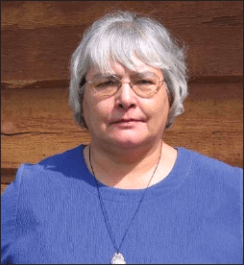Marie Smallface Marule facts for kids
Quick facts for kids
Marie Smallface Marule
|
|
|---|---|
|
Isstoikamo¹saakii
|
|

Marule in 2011
|
|
| President of Red Crow Community College | |
| In office January 6, 1992 – 2014 |
|
| Succeeded by | Roy Weasel Fat |
| Personal details | |
| Born | 1944 Blood Indian Reservation, Alberta, Canada |
| Died | December 31, 2014 (aged 70) |
| Spouse | Jacob Marule |
| Children | 3 |
| Education | BA in sociology and anthropology |
| Alma mater | University of Alberta |
| Occupation | Academic administrator, activist, educator |
| Awards | National Aboriginal Achievement Award (1995) Queen Elizabeth II Golden Jubilee Medal (2002) Alberta Centennial Medal (2005) |
| Scientific career | |
| Institutions | |
Marie Smallface Marule (Isstoikamo¹saakii, 1944 – December 31, 2014) was an important Canadian leader. She was a teacher, an administrator, and an activist. She worked to help Indigenous peoples in Canada and around the world.
Marie Smallface Marule was the president of Red Crow Community College for 20 years. She also helped create many programs that taught about Indigenous cultures. Before that, she was a professor at the University of Lethbridge. She also held important roles in groups like the National Indian Brotherhood and the World Council of Indigenous Peoples.
Contents
Early Life and Education
Marie Smallface was born in 1944. She grew up on the Blood Indian Reservation in Alberta, Canada. She had many brothers and sisters. Her family was part of the Fish Eater clan of the Kainai Nation, also known as the Blood tribe. This tribe is part of the Blackfoot Confederacy.
Her grandmother, Rosie Davis, was born in Montana. She moved to Alberta in 1877. Rosie was a translator for the Royal Canadian Mounted Police. She was also known for her beautiful quilts.
Marie went to school in Cardston with six other students. In 1962, she started attending the University of Alberta. While there, she became very involved with First Nations groups. She joined the National Indian Council and the Canadian Indian Youth Council. She also learned about decolonization from students from Africa. In 1966, Marie was one of the first Indigenous women to earn a university degree in sociology and anthropology from the University of Alberta.
Career Highlights
Working for Change
From 1966 to 1970, Marie traveled to Africa with a group called Canadian University Service Overseas (CUSO). She worked in Zambia, helping with a program to teach people to read and write. She also worked in community development.
While in Zambia, Marie met her husband, Jacob Marule. He was from South Africa and had left his home because of apartheid. Apartheid was a system of unfair rules that separated people based on their race. Marie was inspired by leaders who worked to respect local cultures. She later shared these ideas with George Manuel, who was the first president of the World Council of Indigenous Peoples (WCIP).
After returning to Canada, Marie worked for the National Indian Brotherhood (NIB). She helped the organization by bringing a strong academic view to their work. She also helped plan the first WCIP conference in 1975. This meeting brought together Indigenous leaders from many countries. Marie became the chief administrator of the WCIP. She was also the secretary-treasurer and later the executive director of the NIB.
Marie also served on several important boards. These included the Blood Tribe Police Commission and the Indian News Media. She worked hard to support the rights of Indigenous peoples.
Education Leadership
Marie Marule taught community development at the Nicola Valley Institute of Technology. In 1976, she joined the University of Lethbridge as an assistant professor. She taught about Native American studies, focusing on politics and economic development.
In 1989, Marie moved to Red Crow Community College (RCC). On January 6, 1992, she became the president of RCC. At the college, she created new courses that focused on the needs of Indigenous students. She started the Kainai Studies Program and the Niitsitapi Teacher Education program. These programs helped teach and promote Kainai traditions and knowledge.
Marie believed that education was very important for her community. She also connected First Nations knowledge and culture to other subjects like nursing and science. In 2006, RCC and the University of Lethbridge celebrated their first group of First Nations teachers. These teachers were trained using the Blackfoot Education curriculum. Marie retired from RCC in 2014.
Legacy and Awards
Marie Smallface Marule passed away on December 31, 2014. She left a lasting impact on Indigenous education and human rights. She helped keep Indigenous cultures and languages alive through learning. She made sure that education respected cultural heritage and Indigenous identity.
In 2019, Red Crow Community College started its Indigenous Bachelor of Social Work program. This program was created because of Marie's vision.
Marie received many awards for her important work:
- In 1995, she received the National Aboriginal Achievement Award for education.
- In 2002, she was given the Queen Elizabeth II Golden Jubilee Medal.
- In 2005, she received the Alberta Centennial Medal.
- She also received honorary doctorates from Athabasca University (2006) and the University of Calgary (2010).
- In 2014, she received the Esqoao Dorothy McDonald Leadership Award.
See also
- List of women presidents or chancellors of co-ed colleges and universities
 | Aurelia Browder |
 | Nannie Helen Burroughs |
 | Michelle Alexander |

